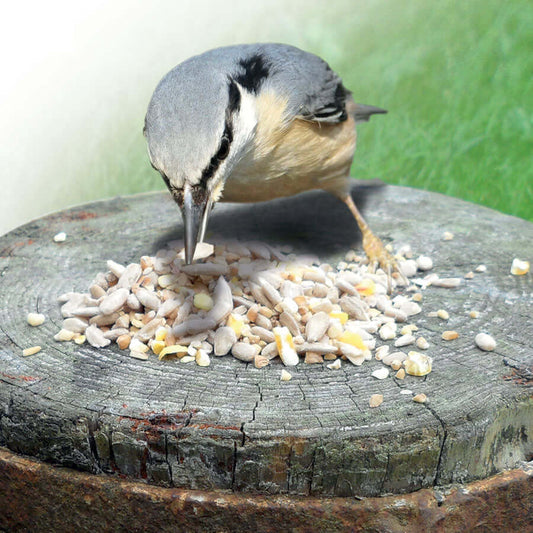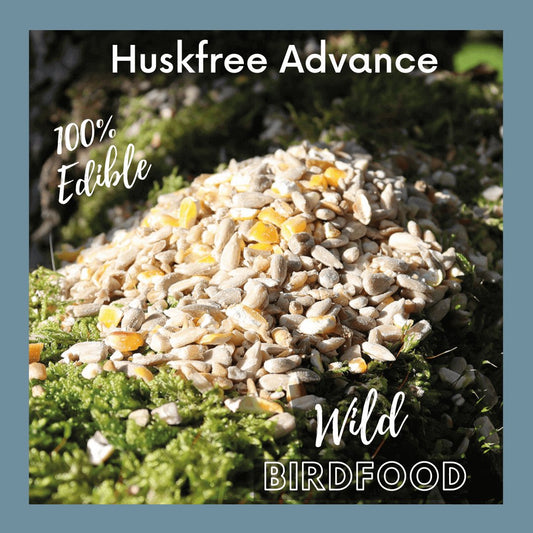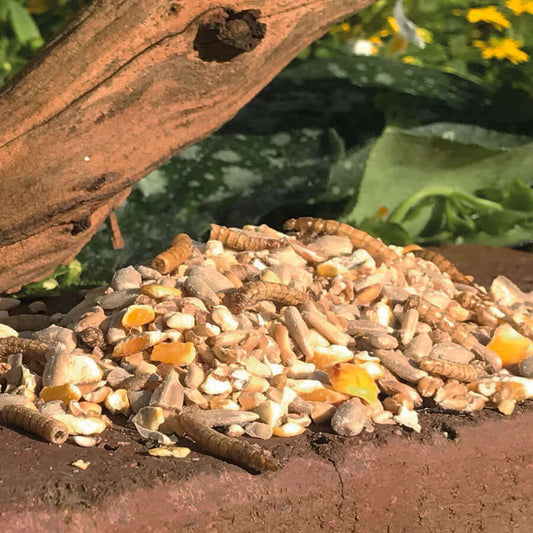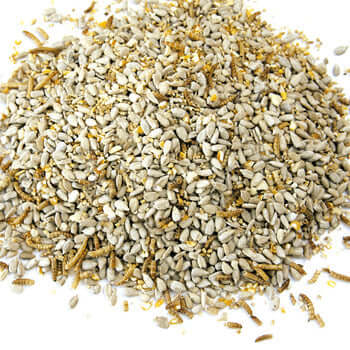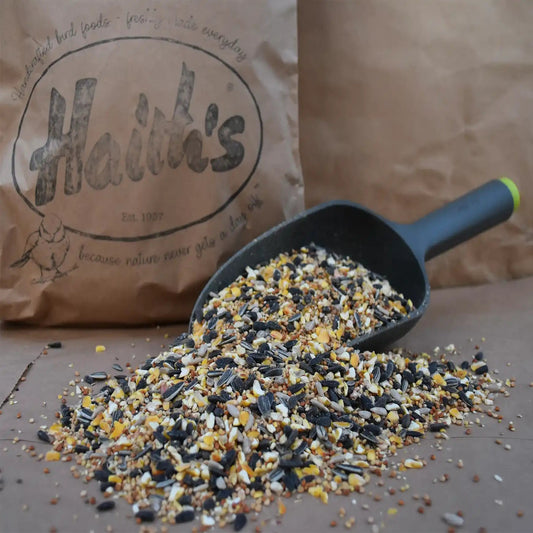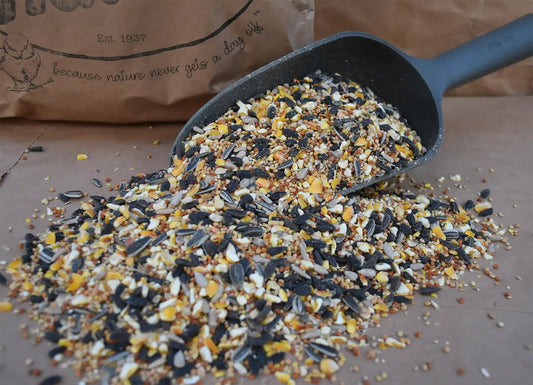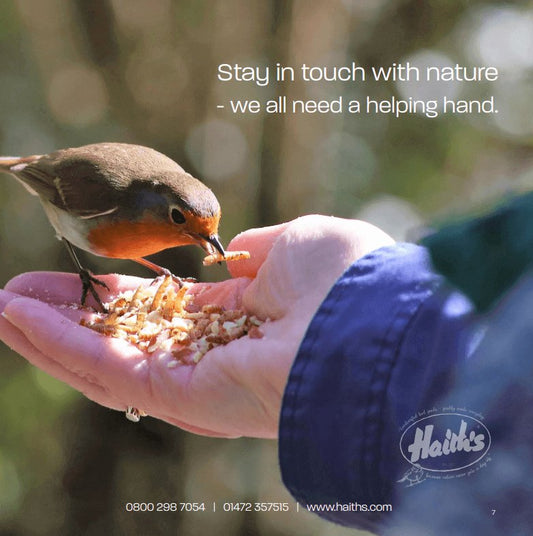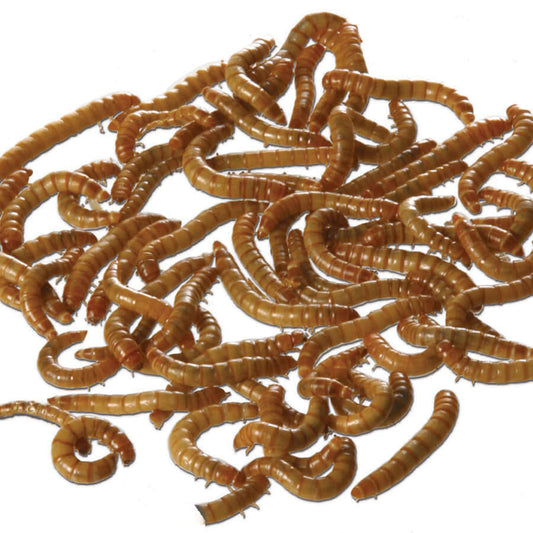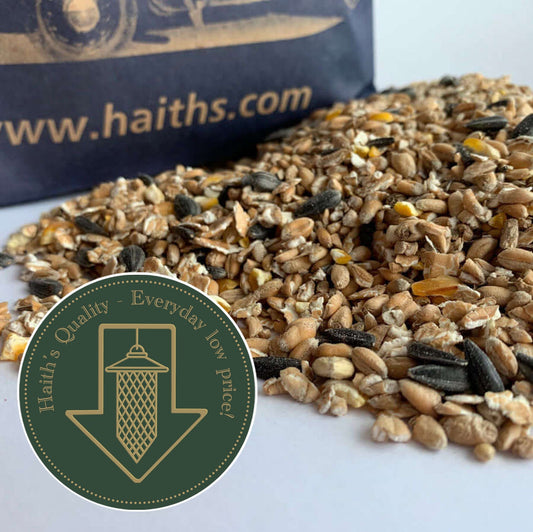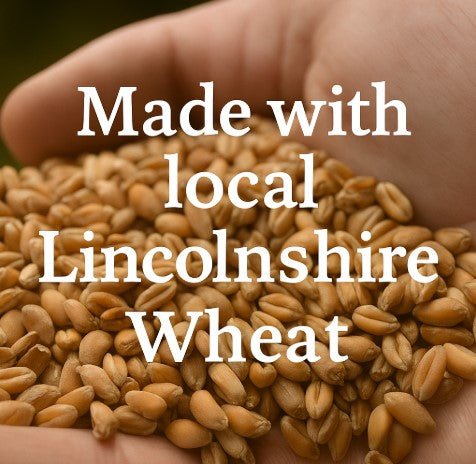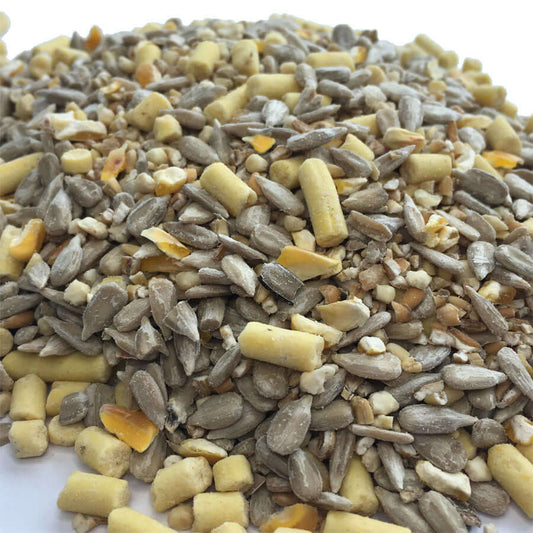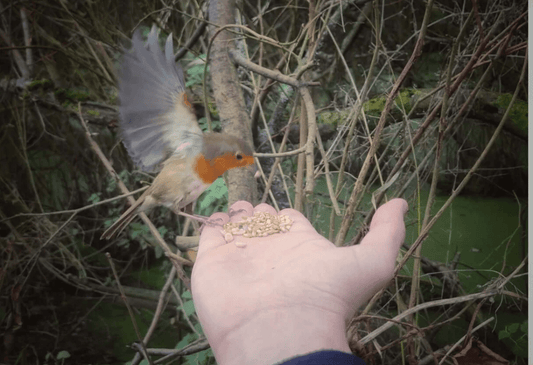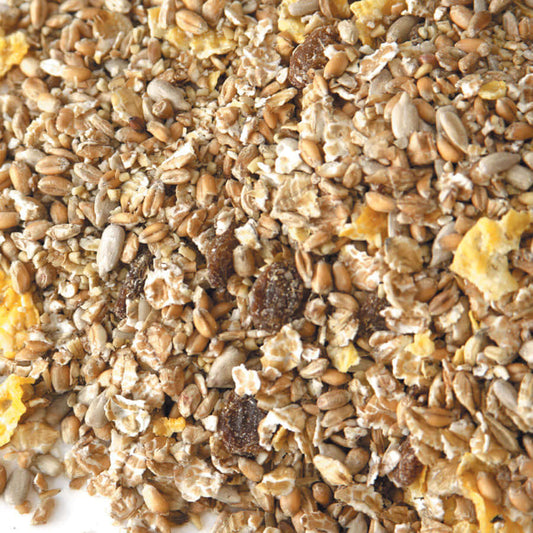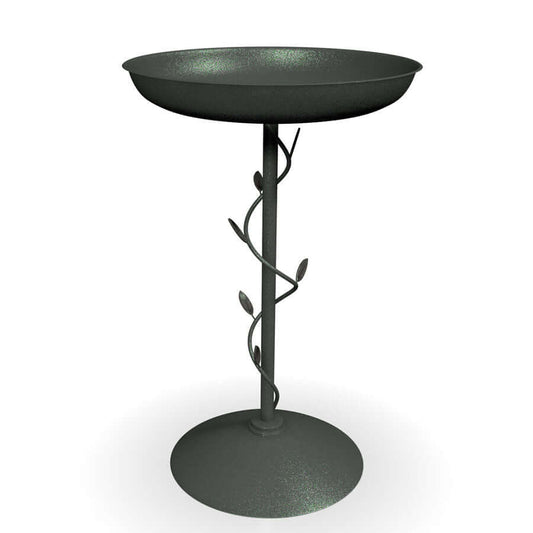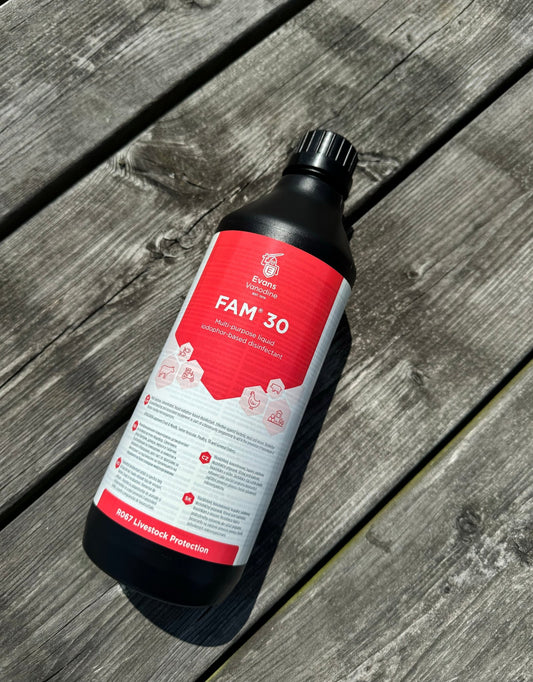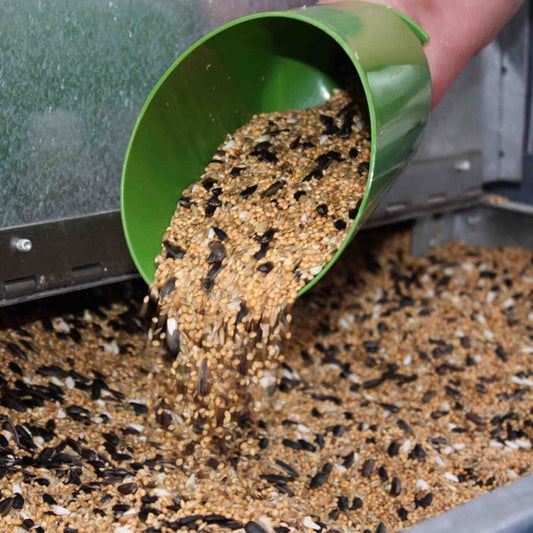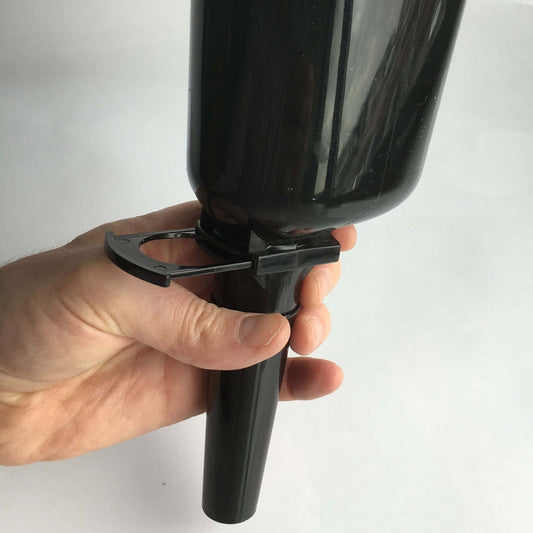The Ultimate Guide to Feeding Wild Birds Safely
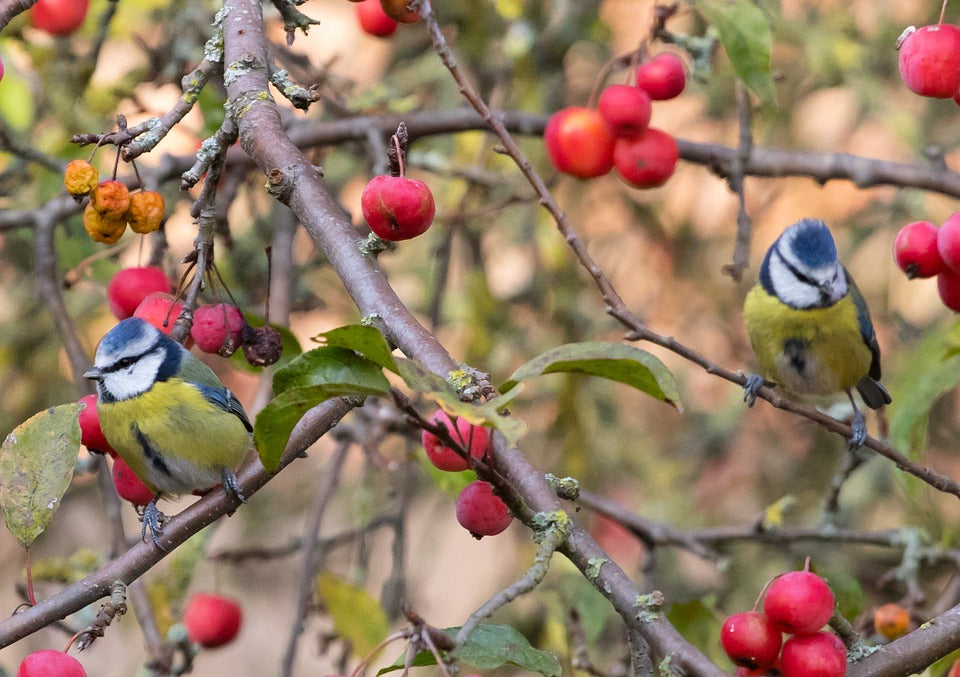
Welcome to your go-to resource for feeding wild birds safely and responsibly
At Haith’s, we’re passionate about promoting bird health and welfare through expert advice, high-quality food, and safe feeding practices. Whether you’re a seasoned bird enthusiast or new to feeding garden birds, this guide provides everything you need to create a safe haven for your feathered visitors. Explore our expert tips and click through to detailed blogs to learn more about each topic.
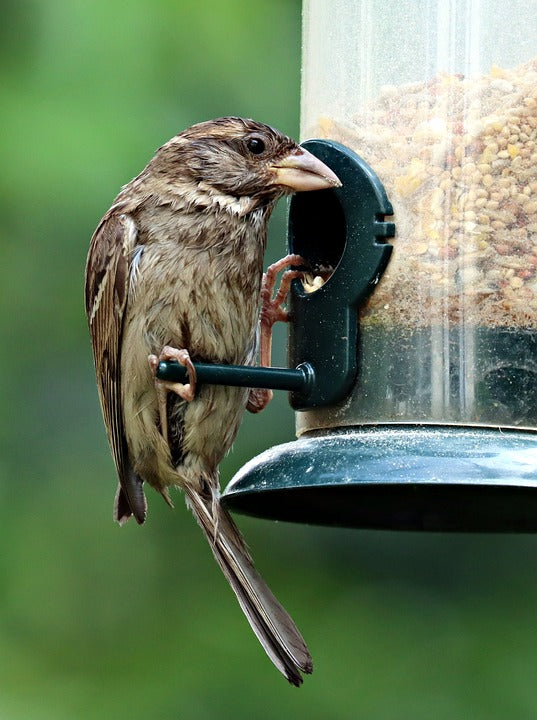
Why Feeding Wild Birds Safely Matters
Feeding wild birds isn’t just about enjoying their company; it’s about ensuring their health and well-being. Poor feeding practices can lead to disease outbreaks, overcrowding, and other risks. By following expert advice, you can make your garden a sanctuary for wildlife while helping bird populations thrive.
Creating a safe feeding environment involves more than simply filling a feeder. It requires understanding how to minimise disease risks, provide proper nutrition, and monitor bird health. With our expert tips and carefully curated resources, you’ll be well-equipped to protect your garden visitors and encourage biodiversity.
-
 Read more about SuperClean bird diets here
Read more about SuperClean bird diets hereChoose High-Quality Food
Low-quality, dusty, or mouldy food can harm birds by introducing toxins and reducing their overall health. Haith’s SuperClean™ diets
are dust-free and rigorously tested to ensure safety and nutrition. These diets provide birds with the energy they need, especially during colder months when survival depends on every calorie. -
 Discover why cleaning bird feeders is non-negotiable
Discover why cleaning bird feeders is non-negotiableRegularly Clean Bird Feeders
Dirty feeders can spread harmful bacteria and fungi, posing serious risks to birds. Regular cleaning with wildlife-safe disinfectants like Safe4 is non-negotiable to maintain a healthy feeding environment. Dirty feeding stations can harbour pathogens like salmonella and trichomonosis, which spread quickly among birds.
-
 Explore the what NOT to feed list
Explore the what NOT to feed listAvoid Harmful Foods
Not all foods are safe for birds. Stale bread, salted peanuts, and mouldy seeds/peanuts can cause digestive issues, dehydration, or even death. Knowing what to avoid is just as important as knowing what to feed.
Explore our SuperClean wild bird foods
-
Huskfree Advance™ - No Mess Wild Bird Food
4.87 / 5.0
(151) 151 total reviews
Regular price From £6.99 GBPRegular priceUnit price / per£6.99 GBPSale price From £6.99 GBP -
Huskfree Advance™ with Mealworms - No Mess Mix
4.86 / 5.0
(65) 65 total reviews
Regular price From £7.99 GBPRegular priceUnit price / per£7.99 GBPSale price From £7.99 GBP -
Premium Wheat-Free Bird Seed Mix - Now with Peanut Granules
4.8 / 5.0
(66) 66 total reviews
Regular price From £5.99 GBPRegular priceUnit price / per£5.99 GBPSale price From £5.99 GBP -
Dried Mealworms for wild birds
5.0 / 5.0
(35) 35 total reviews
Regular price From £6.29 GBPRegular priceUnit price / per£6.29 GBPSale price From £6.29 GBP -
Original Wild Bird Food Mix
4.87 / 5.0
(47) 47 total reviews
Regular price From £4.95 GBPRegular priceUnit price / per£4.95 GBPSale price From £4.95 GBP -
Huskfree Advance™ with Suet Pellets - No Mess Mix
4.75 / 5.0
(48) 48 total reviews
Regular price From £7.99 GBPRegular priceUnit price / per£7.99 GBPSale price From £7.99 GBP -
Fat Robin™ - Soft & Nutritious Bird Blend
4.45 / 5.0
(20) 20 total reviews
Regular price From £4.99 GBPRegular priceUnit price / per£4.99 GBPSale price From £4.99 GBP -
Songster Food for Ground-Feeding Birds
4.95 / 5.0
(19) 19 total reviews
Regular price From £5.95 GBPRegular priceUnit price / per£5.95 GBPSale price From £5.95 GBP
Seasonal Feeding Tips
-

Winter:
Offer high-energy foods like suet, mealworms, and seed mixes to help birds combat freezing temperatures - visit these useful blogs for more tips and insights:
- Winter Survival: Why Birds Need High-Energy Foods
- Top 5 High-Energy Bird Foods to Help Birds Thrive This Winter
- Why Peanuts Are Ideal for Your Feeder In Winter
- The Benefits of Feeding Soft Foods to Birds in Autumn & Winter
-

Spring:
Provide protein-rich options to support breeding birds and chick-rearing. Discover helpful tips and ideas in these recommended blogs:
- Top Tips for Garden Bird Feeding
- Spring Bird Feeding
- Enhancing Your Garden: The Importance of Bird Food Variety
- What Kind of Food Do Birds Like to Eat? Top Picks for Bird Feeders
-

Summer:
Focus on hydration with clean bird baths and lightweight seed blends. Explore these insightful blogs for more tips and advice:
-

Autumn:
Help birds prepare for migration or the colder months with high-energy bird foods and mixes with fruits and nuts.
Gain more insights and advice by visiting these blogs:
Advanced Practices for Bird Health
-

Safe Ground Feeding
Best Practices for Ground-Feeding Birds:Ground feeding supports natural behaviours but requires extra care to avoid contamination. Rotating feeding spots, cleaning regularly, and offering specialist foods like softfoods and mealworms ensure ground feeding is safe and enriching.
-

Rotate Feeding Areas
How to Rotate Feeding Areas for Safer Bird FeedingOverused feeding spots can lead to waste build-up and contamination, making rotation a critical practice. Learn how to manage multiple feeding stations effectively.
-

Recognise Signs of Illness
Recognising Signs of Illness in Garden BirdsHealthy birds are active and alert. Recognising symptoms like lethargy, fluffed-up feathers, or difficulty swallowing can help you intervene early and protect your garden’s population.
-

Prevent Disease Spread
Prevent Disease Spread in Garden BirdsFeeding birds responsibly means adopting hygiene practices that limit the spread of disease. From disinfecting feeders to monitoring bird health, small steps can make a big impact.
Avian Flu & Latest News
-
Advice for wild bird feeding
Click here to find out moreAvian Influenza, commonly known as bird flu, is a disease that affects birds, particularly during the winter migratory season. While it poses a serious risk to birds, the risk to humans is extremely low. If you enjoy feeding wild birds, here’s how you can help protect them and prevent the spread of this disease.
-
Advice for cage and aviary keepers
More advice hereAvian Influenza, or bird flu, is a serious disease that can affect all birds, including those kept in cages or aviaries. While the risk to humans is very low, it’s important for bird keepers to take precautions to protect their birds and prevent the spread of this disease.
-
RSPB's decision to withdraw bird tables from sale
More advice hereFollowing the RSPB’s recent announcement regarding the potential risks associated with bird tables, we’ve taken a precautionary step to remove bird tables from sale until further clarity is provided by ongoing scientific research.
Hygiene essentials
-
Decorative Metal Bird Bath
5.0 / 5.0
(1) 1 total reviews
Regular price £38.00 GBPRegular priceUnit price / per£38.00 GBPSale price £38.00 GBP -
Safe 4 Disinfectant
5.0 / 5.0
(7) 7 total reviews
Regular price From £8.99 GBPRegular priceUnit price / per£8.99 GBPSale price From £8.99 GBP -
Bird Feeder Cleaning Brush
5.0 / 5.0
(5) 5 total reviews
Regular price £2.95 GBPRegular priceUnit price / per -
CitroSan for bird hygiene
5.0 / 5.0
(1) 1 total reviews
Regular price £7.00 GBPRegular priceUnit price / per£7.00 GBPSale price £7.00 GBP -
Vanodine's FAM 30 - NEW (Replaces Vanodine V18).
5.0 / 5.0
(3) 3 total reviews
Regular price £22.99 GBPRegular priceUnit price / per£22.99 GBPSale price £22.99 GBP -
Bird Seed Scoop - makes filling bird feeders easy
5.0 / 5.0
(4) 4 total reviews
Regular price £5.99 GBPRegular priceUnit price / per
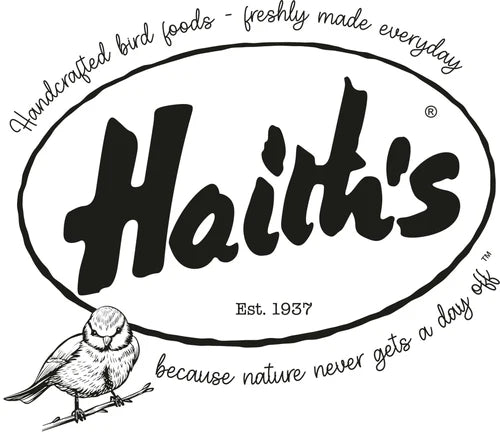
Why Choose Haith’s?
With over 80 years of experience, Haith’s is a trusted leader in bird food innovation. Our SuperClean™ diets are carefully curated to meet the nutritional needs of birds while prioritising safety and cleanliness. We partner with experts to provide the highest quality food and guidance for bird lovers like you.
Explore our SuperClean bird foods - you're safe with Haith's
Latest news and best bird feeding practices
Promoting Safe Feeding Practices on the Ground and in Bird Feeders FAQs
The RSPB has stopped selling bird tables and window feeders, have Haith's?
Supporting Bird Welfare: A Precautionary Step
At Haith's, the health and well-being of birds is our top priority. In light of the RSPB's recent announcement regarding the potential risks associated with bird tables and window feeders (8th Jan 2025), we have decided to remove bird tables from sale as a precautionary measure.
This decision aligns with the RSPB's precautionary approach while they review the latest scientific findings on disease transmission among garden birds. Our veterinary advisor has written to the RSPB for more information and this page will keep birders up to date.
Haith's (and the RSPB) encourage bird enthusiasts to explore alternative feeding solutions, such as hanging bird feeders or ground feeding (when done responsibly). To help support safe feeding practices, please keep bird feeders clean and hygienic and - just as important - don't feed uncleaned bird food because it's dangerous to birds.
Why is it important to keep bird feeders and tables clean?
Dirty bird feeders and tables can harbour harmful bacteria, parasites, and other pathogens that can cause diseases among garden birds. Regular cleaning helps minimise these risks and protects your feathered visitors.
Personal hygiene, especially hand-washing, is important before and after feeding wild birds or following cleaning of areas where they are offered food.
How often should I clean my bird feeders and tables?
Clean your feeders and bird tables at least once a week using warm, soapy water or a wildlife-safe disinfectant, such as Safe4. Rinse thoroughly and allow the equipment to dry completely before refilling. For heavily used feeding areas, daily cleaning may be necessary.
What are the best practices for ground- feeding birds?
Ground-feeding can be safe and beneficial when done responsibly:
• Rotate feeding spots: Move ground-feeding areas regularly to prevent the buildup of droppings and uneaten food.
• Provide high-quality food: Use clean, high-energy mixes, suet pellets, and mealworms suited for ground-feeding birds.
• Feed in moderation: Only put out as much food as birds can eat in a day.
• Keep the area clean: Clear debris daily and disinfect areas regularly to reduce the risk of build-up of bacteria, parasites, and other pathogens.
What types of food should I provide for ground-feeding birds?
Ground-feeding birds enjoy:
• High-energy bird food blends
• Suet pellets
• Mealworms
• Specialist softfoods
Avoid feeding birds kitchen scraps, mouldy seeds, or stale bread, as these can be harmful to their health.
How can I promote natural behaviour in garden birds?
Encourage birds to forage naturally by:
• Planting bird-friendly plants that produce seeds and berries.
• Leaving leaf litter to attract insects for ground-foraging species.
• Hiding food in natural features like tree crevices or amongst rocks to simulate wild feeding habits.
What should I do if I notice sick birds in my garden?
If birds appear lethargic, fluffed-up, or have swollen eyes, pause feeding immediately and clean all feeders and tables thoroughly. Allow birds to disperse naturally, which helps reduce the spread of pathogens . If necessary, consult a wildlife expert for guidance.
Why should I rotate feeding areas in my garden?
Regularly moving feeding areas minimises the accumulation of droppings and leftover food, reducing the risk of disease transmission and discouraging pests.
How can I create a self-sustaining bird-friendly garden?
Support wild birds by:
• Planting native shrubs and trees that produce natural food sources.
• Providing water for drinking and bathing.
• Leaving areas of your garden undisturbed to encourage insects and other natural food sources.
Where can I find more information about feeding and bird safety?
Visit our blog section for expert advice on safe feeding practices, bird hygiene tips, and information about our high-quality SuperClean Seed and bird care products.
At Haith’s, bird welfare is our priority. We continuously review our practices and products to align with the latest scientific guidance. By combining high-quality food, and promoting responsible feeding practices, we aim to support the health and well-being of garden birds.
For more resources or to explore our range of feeders and SuperClean Seed, visit www.haiths.com
Our Commitment to Bird Welfare:
-

SuperClean™ Diets:
Dust-free, rigorously tested seeds that reduce contamination risks.
-

Expert Advice:
Explore our wildlife blogsAccess blogs and resources written by bird care specialists.
-

High-Quality Products:
From specialist softfoods to wildlife-safe disinfectants, we offer everything you need for safe feeding.
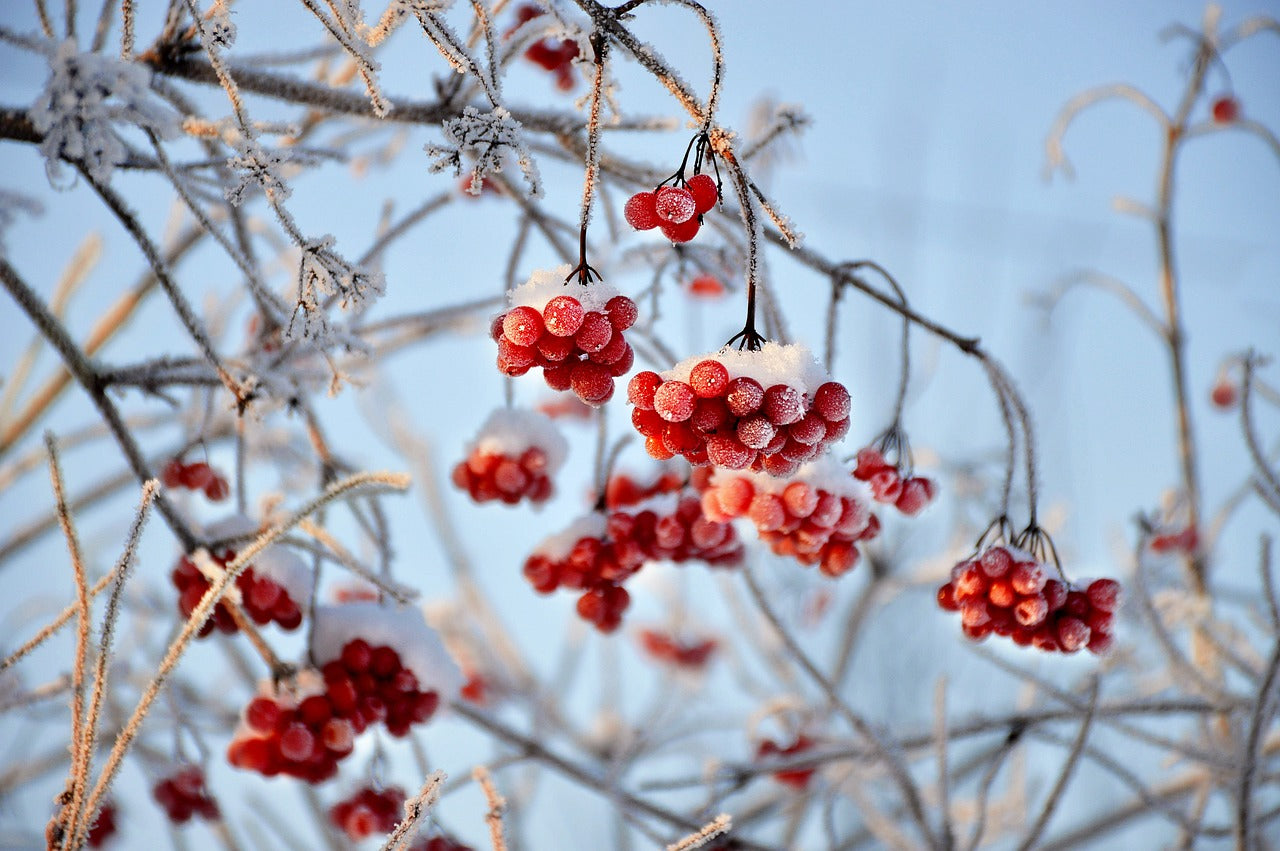
A Year-Round Resource for Bird Enthusiasts
Feeding wild birds safely is a year-round commitment, and we’re here to support you every step of the way. By following the advice in this guide and exploring our detailed blogs, you can create a safer, more welcoming environment for your feathered friends.
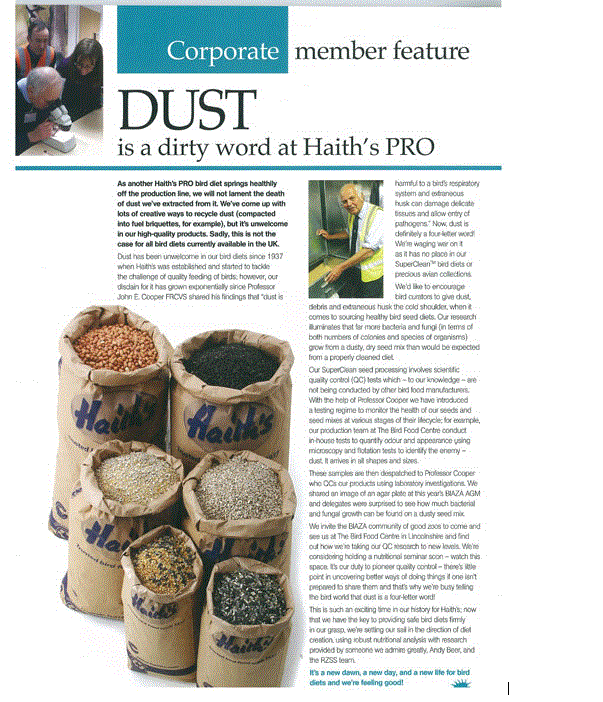
Why SuperClean a bird diet?
Because Dusty Bird Food Kills Birds: Learn how Haith's ensures cleanliness.
Blog posts
View all-

How Wild Garden Birds Survive the Snowy, Icy Wi...
Winter can be a magical time, when frost dusts rooftops and gardens fall silent beneath a blanket of snow.
How Wild Garden Birds Survive the Snowy, Icy Wi...
Winter can be a magical time, when frost dusts rooftops and gardens fall silent beneath a blanket of snow.
-

Christmas Traditions Rooted in Nature
From ancient rituals to the animals we associate with the season, winter offers a glimpse into the origins of our festive celebrations.
Christmas Traditions Rooted in Nature
From ancient rituals to the animals we associate with the season, winter offers a glimpse into the origins of our festive celebrations.
-
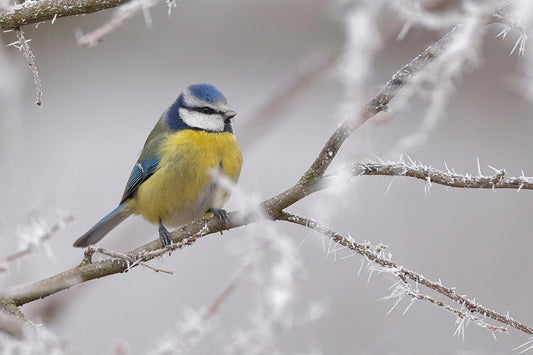
Feeding Garden Birds in Winter: How to Help and...
At Haith’s we believe that feeding garden birds is one of life’s simplest and most rewarding pleasures - especially in winter.
Feeding Garden Birds in Winter: How to Help and...
At Haith’s we believe that feeding garden birds is one of life’s simplest and most rewarding pleasures - especially in winter.




